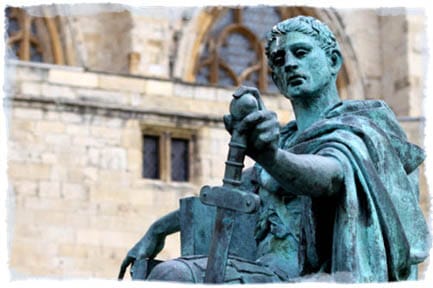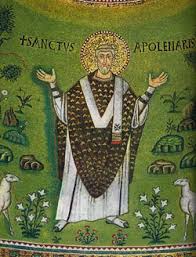Have you noticed that, generally-speaking, Christians like to argue?
Maybe we get it from our spiritual ancestors, the Jews. Once while on a tour of Jerusalem at what are called the Southern Steps of the Temple Mount, our Jewish guide told us that a frequent joke among his people was that where there are 2 Jews, there’s 3 opinions.
Yeah; it seems controversy has been a part of the history of The Church since its inception. And maybe that’s really more a “human” tendency than something unique to, or the sole prerogative of the followers of Jesus.
In this 4th episode on the The First Centuries of the Church, we’re taking a look at an acrimonious debate that split the Church into warring camps before the end of the 2nd C. Even while facing the pressure of persecution from without, believers decided to spin up their own internal stress.
Surely: If Christians were going to draw lines and take sides while being battered by a world of hostile pagans, what they argued over must have been super-important, right? I mean, we must be dealing with some critical issue of theology; an essential of the faith!
Well, they certainly thought it was important. We, on the other hand probably DON’T find it that crucial. It all had to do with the timing of Easter. Yep: They went to town on when to commemorate the death & resurrection of Jesus.
As we examine this, I could go into the minutiae of detailed terminology and the fine nuances theological musings that under-pinned the different positions taken at that time. I’m not going to do that for this reason à It would bore the bejeebers out of nearly everyone, and, I’d be mouthing stuff I don’t understand. BUT: by saying it, some might assume I do, and that would make me appear way, way smarter than I in fact am. That would be misleading. Honestly, as I read & researched this episode, I found I had to re-read numerous passages, several times, and only then conclude, “Uhh, I’m never going to understand that. Can someone please draw a picture; an illustration so my puny noggin can grasp that?”
Ha! One of the marks of greatness as a teacher is the ability to take complex ideas and make them accessible to those of average intellectual capacity. So, it’s been interesting over the years to read & research. When I find material that’s verbose but after reading it, I find I’m no closer to grasping it than when I began, I’ve come to realize it’s less about my incapacity as it is the writer’s inability to communicate. It’s rare that I read material that isn’t pitched to what we’d call a general audience. I expect technical jargon and a bit of the opaque when reading something the author assumed would be read by a set of professional peers.
And I say all that to share that when studying the early Easter Controversies, several of the authorities write of it in such a complicated manner, it makes me wonder if they grasped the material they recorded. Other authors admit handling this subject is a challenge. While we have some names and dates, parsing the subtlety of the debate is inordinately difficult.
So, there’s no way I’m going to shed light on the real crux of this issue. What I WILL do, is simply share a brief narrative of events as best we know it, and attempt to sort through the major themes.
While the first record we have of a discussion on the issue of when to commemorate Easter dates to AD 150, that it DOES arise at that time, means it was something that was already at play in the life of the Church. Polycarp, bishop of Smyrna in Asia Minor, visited Anicetus [Ah-nee-kee-tohs] the bishop of Rome. As they shared, the issue of when to celebrate Easter arose. The Church in Asia Minor, that is, all those churches Jesus sent letters to in Revelation 2&3 as well as dozens of other fellowship lcaoted across the region, commemorated the Last Supper on the 14th of Jewish month of Nisan, the same date as the Jewish Passover, & Jesus’ resurrection two days later, regardless of the day of the week. The Roman church was committed to commemorating Jesus’ Resurrection on a Sunday. While the two church leaders discussed the merits of their positions, neither persuaded the other and parted, literally, agreeing to disagree.
We have an interesting account of the dispute from Polycarp’s pupil, Irenæus. 2
When the blessed Polycarp sojourned at Rome in the days of Anicetus, and they had some little difference of opinion likewise with regard to other points, they forthwith came to a peaceable understanding on the [observance of Easter], having no love for mutual disputes. For neither could Anicetus persuade Polycarp not to observe inasmuch as [Polycarp] had always observed with John, the disciple of our Lord, and the other apostles, with whom he had associated; nor did Polycarp persuade Anicetus to observe who said that he was bound to maintain the custom of the [elders] before him. These things being so, they communed together; and in the church Anicetus yielded to Polycarp, out of respect no doubt, the celebration of the eucharist, and they separated from each other in peace, all the church being at peace, both those that observed and those that did not observe [the 14th of Nisan], maintaining peace.”
Irenaeus’ account proves Christians at the time of Polycarp knew how to keep the unity of the Spirit without requiring uniformity of ritual. Later in the same letter, Irenaeus goes so far as to laud this when he writes, “The difference in our [ways of] fasting, establishes the unanimity in our faith.”
Eastern churches, followed a Jewish chronology, adhering to the authority of the Apostles John and Philip. They celebrated a Christian Passover on the same day as the Jewish Passover, the 14th of Nisan, which of course, could fall on any day of the week. They did this by keeping a fast which ended by sharing a meal & taking communion in the evening. Because we love labeling people according to all kinds of things, these Eastern, Asian Christians came to be called 14th-ers, but that doesn’t sound very sophisticated, so they picked the latin Equivalent è Quartadecimanians. A little long to put on a team jersey, so I’m sure their more popular name was something like, “Quartas” or “Decamins.” Though the church at Rome followed a different calendar for commemorating Easter, the Quartadecimanian observance was most likely the oldest and accorded with the Synoptic Gospels account of Jesus’ last Passover, which it commemorated.
The Roman church also appealed to custom and perennially celebrated Jesus’ death on a Friday, the day of the week it was reckoned to have originally occurred, with His resurrection always on a Sunday after the March full moon.
Nearly all Western churches agreed with Rome, and laid heavy stress on commemorating Jesus’ resurrection on a Sunday. The Roman practice created an entire week of solemn fasting, ending with a feast celebrating the Resurrection while the Asiatic practice ended their fast in the evening of the 14th of Nisan, which might fall several days before Sunday.
So, in short, the Eastern Church was more concerned to line up their commemoration of Jesus’ death & resurrection with the Jewish Passover on the 14th of Nisan, regardless of what day of the week it fell on. The Western Church was all about keeping the commemoration of Jesus’ death on a Friday and His resurrection on a Sunday.
It was a controversy over a date in the month versus a day of the week.
Heavy stuff. Break out the knives!
The debate eventually settled in around the idea of how closely the Christian commemoration of Jesus’ death & resurrection ought to be tied to the Jewish Passover. That was a no-brainer to the first Christians who as Jews continued to keep the Passover, though they saw it now as prophetic of, and fulfilled by Christ, the ultimate Passover lamb who takes away the sins of the world. But The Church became primarily Gentile in make-up, then hostility grew between Jews & Gentiles, Christians had no qualms of stepping away form its Jewish connections. On the contrary, some argued against the Quartadecimanians for precisely that reason. They wanted to expunge the Faith from any and all taint of Judaism.
But the Johannean tradition dominant in Asia represented a clinging to historical precedent and had the advantage of an immovable Easter, without being Judaizing in anything but the observance of a fixed day of the month. The Roman practice seemed to stand for freedom and discretion with an independent festival schedule. Looked at another way, the Eastern practice leaned heavily toward commemorating Jesus’ death, while the West placed the emphasis on His resurrection.
As I prepare this episode, I’ve just finished the message for this coming Sunday out of Mark 7 where Jesus was challenged by His critics over questions of ritualistic tradition. So I can’t help but analyze all this from what He said there. It seems clear to me that far more than questions of doctrine, Church leaders were consumed in these Easter Controversies with the dogmatic and ritualistic; with traditions far more about man-made rules than what God’s Word said. Truth be told – where in any of Jesus’ teaching, the Book of Acts, or in the letters of the NT do we see the Church being called on to commemorate Jesus’ death & resurrection once a year? What we have is His command to celebrate the Lord’s Supper, Communion, Eucharist, or whatever other label it goes by in the various movements of the Faith. But few and far between are those who think that means ONLY a once-annual event called Easter. Considering how acrimonious the whole argument got, with some coming to outright blows, we have to conclude the whole thing grieved God.
Still, considering it purely historically, and remembering to evaluate things based not on our values, but those of the time, the controversy was fueled mostly from a profound awareness that everyone who called themselves a Christian ought to believe the same thing. That title catholic really meant something.
Remember, the word means “universal” and long before it was used to describe a major branch of the Church and was modified by the term “Roman,” it simply meant what all Christians believed and practiced – as opposed to the schismatics who’d moved into error and broken away.
Church leaders all owned the priority to maintain unity and to root out what they deemed divisive. So they regarded it as crucial to make sure everyone kept the commemoration of Jesus’ death & resurrection on the same day. Heaven forbid that some people would be fasting in honor of His death at the same time others were feasting in celebration of His resurrection!
And because of this, the Roman tradition eventually triumphed. Easter became a movable holiday whose date varies from the end of March to the latter in April.
It was the first major church council at Nicea in 325 that the date for Easter was finally fixed. The Council condemned Quartodecimans as schismatics. Not heretics mind you – just schismatics. While a heretic has rejected the Faith and so is lost, a schismatic is going to heaven, but errors on an important point of doctrine. Not essential doctrine, but important enough they have to be put out of Communion with The Church.
We’ll end this episode by briefly say while the Council of Nicea effectively ended the Easer Controversy on the Continent, the Celtic Church in Britain refused to knuckle under and kept their own counsel regarding when to celebrate the death & resurrection of Christ. While ancient church leaders would likely argue the point, modern historians tend to see the Celtic position as more about the assertion of their independence than out of some dearly held belief of when & how to keep Easter.






I find this episode quite.. “intriguing.” I find myself chuckling with the amusement, and slightly saddened at the same time. Some of us would like to believe that these sort of “differences of thought and opinion” occurred much later in our church history. If anything, it goes to show that the early “saints” were people just like we are. The apple can apparently roll along way from the tree, with little change from the tree 😉
I must again say how much I appreciate these podcasts, because it brings the exercise of my faith under scrutiny (in a positive way), and softens my attitude towards others who don’t quite see it like I do. I’m a staunch believer in right doctrine and theology; I just want to make sure what I’m being “staunch” about is actually right doctrine and theology. This history helps me keep things in perspective, if not see things from another perspective all together.
Once again, Lance, we thank you!